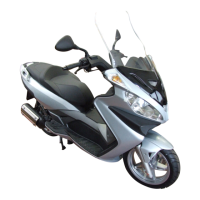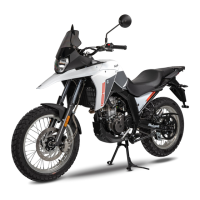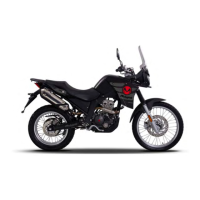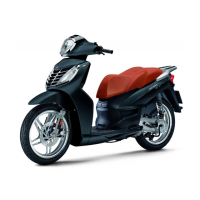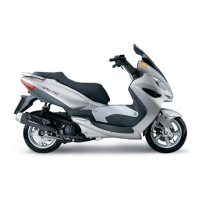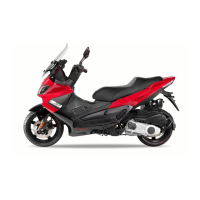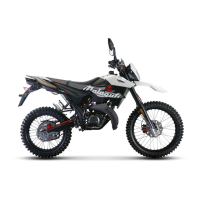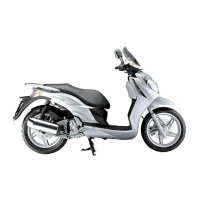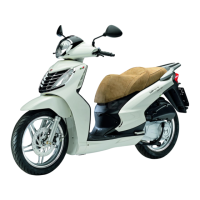Do you have a question about the Malaguti MONTE 125 and is the answer not in the manual?
Welcomes the user and introduces Malaguti's philosophy regarding product improvements.
Explains the importance of signals in the manual for finding key information.
Highlights warnings related to personal safety when following manual instructions.
Indicates proper driving behavior to protect the environment from vehicle use.
Warns about potential damage to the vehicle and warranty voiding from non-compliance.
Identifies and describes the function of each control on the handlebar.
Details the various indicators and displays on the motorcycle's instrument cluster.
Explains how to use the tachometer, clock, and odometer functions.
Describes the trip meter, speed display, maximum speed, speed counter, and gear indicator.
Explains the operation of the light switch, horn button, and turn signal switches.
Details the different key positions and how to operate the steering lock.
Explains how to start the engine using the starter switch, ensuring neutral gear.
Details the proper use of the front brake lever, emphasizing smooth application.
Explains how to use the clutch lever and its function for shifting gears.
Details how to accelerate and decelerate using the throttle grip.
Describes how to activate/deactivate ignition, steering lock, fuel tank, and seat lock.
Step-by-step instructions on how to open the fuel tank cover, including warnings.
Specifies the location of the frame and engine numbers stamped on the motorcycle.
Lists essential checks to perform before starting the engine, including fuel, oil, and chain.
Details the total fuel capacity, reserve, and recommended fuel type for the motorcycle.
Provides critical safety instructions for refueling, including engine off and no smoking.
Explains the importance of correct tyre pressure and how to adjust it, emphasizing cold tyres.
Advises on maintaining good tyre condition and replacing worn tyres for safety.
Provides specific cold tyre inflation pressure values for front and rear tyres of different models.
Instructions for removing and reinstalling the motorcycle seat using the ignition key.
Guidance on how to break in the engine during the first 1000 km for optimal performance and longevity.
Step-by-step guide to starting the engine, including pre-operation checks.
Instructions for safely shutting down the engine and parking the motorcycle.
Provides solutions for common starting problems like flooded engine or no fuel.
Offers advice on operating the engine when cold and after long trips to prevent damage.
Provides essential tips for safe operation, including protective gear and basic vehicle knowledge.
Offers advice on adjusting speed for road conditions, wet roads, and braking techniques.
Warns against driving under the influence of alcohol, drugs, or medication.
States that modifications affecting performance or structure are illegal and unsafe.
Guidance on positioning additional loads for optimal safety and vehicle balance.
Ensures sufficient space and ground clearance when carrying additional loads.
Recommends using provided tools and emphasizes the importance of engine oil quality.
Specifies the engine oil type (SAE 10W-40 semi-synthetic) and capacities.
Step-by-step guide to checking the engine oil level using the dipstick.
Explains how to read the oil level and warns against using incorrect oil types.
Detailed steps for draining old oil and refilling with new oil, including filter cleaning.
Instructions for cleaning and inspecting the oil filter, its rubber ring, and stopper ring.
Provides crucial safety and environmental guidelines for handling and disposing of used engine oil.
Step-by-step instructions for removing the spark plug, including necessary tools and precautions.
Details the correct electrode gap for the spark plug.
Warns about the consequences of using incorrect spark plugs or not replacing them regularly.
Detailed steps for cleaning the air filter foam element using cleaner and filter oil.
Explains the impact of a dirty filter and warns against operating the engine without the filter.
Identifies the location of the front brake fluid reservoir on the handlebar.
Explains how to check the brake fluid level and what causes it to drop.
Provides instructions for refilling the brake fluid, including the specified fluid type.
Covers safety precautions for brake fluid, checking for leaks, and brake system adjustments.
Explains that brake fluid absorbs moisture, affecting brake performance.
Recommends replacing brake fluid every 2 years due to its hygroscopic nature.
Step-by-step instructions for installing the battery, including connecting terminals.
Details battery discharge rates, monthly charging, and handling precautions.
Warns against exceeding maximum charging current to prevent battery damage.
Specifies requirements for replacing the battery with one of equal capacity and voltage.
Provides instructions for periodic battery charging and terminal connection when storing the vehicle.
Identifies the location and ratings of the two main fuses protecting the electrical system.
Advises on finding the cause of blown fuses and warns against improper replacement methods.
Explains factors affecting chain life and the importance of regular checks and adjustments.
Details how to inspect the chain for slack, wear, damage, and proper alignment.
Provides instructions for lubricating the drive chain every 500 km using specific products.
Warns against installing new chain components with worn sprockets or vice versa.
Instructions for replacing headlight bulbs, including low/high beam and position lights.
Procedure for accessing and replacing bulbs in the turn signals.
Step-by-step guide to properly adjust the headlight beam for safe night driving.
Explains that brake pad and disc wear compensate automatically, usually not requiring adjustment.
Guides on checking pad thickness and adjusting brakes if they feel too soft or elastic.
Instructs on checking the free play of the throttle grip, not exceeding 4mm.
Details how to adjust throttle grip play using adjustment screws and lock nuts.
Specifies the correct play for the clutch lever (8mm) and how to check it.
Guides on adjusting the clutch lever play using adjustment screws, or contacting a dealer if stuck.
Provides steps for preparing the vehicle for long-term storage, including cleaning and fluid management.
Instructs on battery maintenance and charging during periods of inactivity.
Detailed steps for cleaning the vehicle's bodywork, emphasizing low-pressure water and proper detergents.
Provides warnings against high-pressure water, washing in sunlight, and using specific cleaning solvents.
Troubleshooting steps for when the engine does not start, including ignition and spark plug checks.
Addresses issues like reduced noise, stalling, irregular running, and backfiring.
Troubleshooting steps for high fuel consumption, often related to the air filter.
Emphasizes using original Malaguti parts for quality assurance and warranty validity.
Details engine type, cylinder count, bore/stroke, displacement, and compression ratio.
Covers ignition system, engine cooling, lubrication, and specified engine oil.
Lists key engine components like EFI valve, spark plug, clutch, and transmission.
Details the number of gears and secondary transmission (chain) ratios.
Lists components of the electrical system, including starter, ignition, battery, and lighting.
Details the chassis type, front and rear suspension systems.
Provides specifications for front and rear disc brake systems.
Lists front/rear tyre sizes and fuel tank capacity.
Provides key overall dimensions of the motorcycle, including length and wheelbase.
| Displacement | 124.8 cc |
|---|---|
| Cooling System | Liquid cooled |
| Transmission | 6-speed |
| Fuel System | Electronic Fuel Injection |
| Seat Height | 820 mm |
| ABS | Yes |
| Width | 780 mm |
| Engine Type | Single cylinder, 4-stroke |
| Front Brake | Disc |
| Rear Brake | Single disc, 220 mm |
| Front Suspension | Telescopic fork |
| Rear Suspension | Mono shock absorber |

